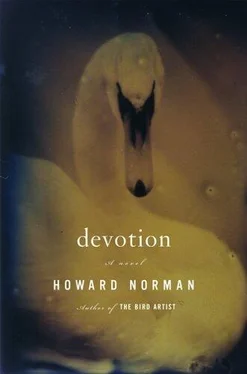David’s grandfather on his mother Ardith’s side had been born in Prague. When David was eleven, his mother showed him some old, yellowed family photographs taken in Czechoslovakia — what was then part of the Austro-Hungarian Empire — in the late 1800s. David asked, “Which one is grandfather?” Ardith replied, “None — these are photographs your grandfather took. ” It proved to be a short-lived delusion, but David thought somehow his own photography might prove original enough to dignify a sense of provenance. However, after photographing in Prague whenever he could, it became evident that his work was at best second-rate Sudek, all inherited sensibility, the master’s influence insistent in almost every photograph David took, even those he meditated on for weeks in advance. This was a kind of artistic malady; in effect, he could only sit next to Sudek on a park bench, stand when Sudek stood, follow a few steps behind, nod to the same passersby, similarly adjust his light meter and lens readings. A shadow photographer.
At a low point of his creative life, David, after mulling it over through a sleepless night, took it upon himself to organize his research on Sudek with the intention of writing some sort of biographical monograph or intimate study. He had always written well. This was the better choice, really. Because he had to admit that despite his technical skills, as a photographer he failed to discover an individual aesthetic. Still and all, in London he more than kept around photography. He taught a history of photography night course sponsored by the Tate Gallery. The longtime instructor, Mitchell Bowen, had fallen ill and suggested David as a fill-in. However, Bowen’s illness proved more serious than anticipated; he had to retire and David stayed on.
David knew that for the Tate it was a matter of convenience, but he was determined to do a good job — to keep the employment. By the time he met Maggie, he was in his third year of teaching the course. Each class was comprised of fifteen students whose ages varied greatly. The course extended over two academic semesters, September through May, with the usual Christmas-New Year break. Class met from six to ten o’clock on Monday evenings. The first year of teaching, the thoroughness of David’s preparation overcompensated for any ambivalence he felt, worry about getting stymied halfway through a lecture, a sense of fraudulence in the very role of teacher. The second and third years he still fiddled with lecture notes late into Sunday nights, but he was far more comfortable with the work. Critical evaluations from students were more than favorable. The Tate was pleased. David grew to enjoy the discussions, often spiced his lectures with gossipy anecdotes from his historical research and conversations with other photographers in London. Truth be told, along with his intermittent love affair with Katrine Novak and dinners with his photography group, students were David’s social life. He had never thought of himself as a loner, just someone who was alone a lot. Both his parents were dead and buried, in different cemeteries in Vancouver. He had socked away their life insurance money. His steepest expenditures were on film and travel fares. He had his modest teaching salary. He liked living in London.
It was love at first sight. On April 13 Maggie had accompanied the Dalhousie Ensemble to London. It was the first stop on a six-city European and Scandinavian tour. The ensemble put up at Durrants Hotel and the next day began morning rehearsals at Queen Elizabeth Hall. It was nearly 2 P.M. and had begun raining. David was sitting in the bar just down the hall from the lobby, drinking a ginger ale to soothe his stomach. The bartender was watching a rugby match on television. At a wooden table three window washers scheduled to clean the hotel’s outside windows sat in black leather chairs, smoking and talking, celebrating the turn in weather. “Nice of this rain to give us this time together, eh lads?” one said. “Let’s not even suggest doing the inside windows. Let’s just keep mum about that, what?” They clinked beer mugs. Their buckets and squeegees were in a corner. David finished his ginger ale and decided to head home; he’d left his umbrella in his flat. When he stepped into the lobby he saw Maggie sitting in a high-backed chair of hard red leather with wooden armrests. She was reading a book. He tilted his head in order to take in the cover and tide, The Crime of Sylvestre Bonnard. He had not heard of the author, Anatole France. She looked up from the book, not at David, checked her watch, stood and walked outside under the awning. David immediately went there too. That is where they met, David with his jacket caped over his head, Maggie waiting for a doorman to flag down a cab.
To David, the simple fact was love at first sight. The moment provided the definition. He felt a complete realignment of emotions, along with the unbearable advance regret at not seeing this woman again. Whatever her name might be, whatever her life might be. He felt these like pangs, felt them almost hypnotically. He was prepared to get into his own taxi and despite all cinematic cliché order the driver to “follow that cab,” he felt such stupefying urgency about her. If your heart is sinking you must act on it, “follow that cab,” like a 1940s gumshoe trying to catch up with his own fate. Had Maggie not paid him any mind, he might have done that very thing. He was aware, for an instant, of wanting this to be a philosophical moment, earned by years of waiting for it; wanted to maintain control of his senses. When all he really felt was apprehension and nerves and bewildering abandon, all enough to nearly render him dumb. Of course, one should never expect such good fortune. Not unless you are self-deluded beyond reason. That is just not the world. No, if it is love at first sight, you simply are in it. You cannot hope to step back and observe. His muddle-headedness was such that he could only eavesdrop on his own brain as it came up with nothing but “Hello,” which he said. He and Maggie Field looked at each other’s face, studied it, you might say, for just a moment.
“Actually, I can stand flirtation only in small doses,” she said. “So that sufficed.”
“My name is David Kozol.”
A cab then pulled up. The doorman opened its back door and Maggie said, “If I want to introduce myself, I’ll be back in about an hour. I’m not staying at this hotel.” She then crouched into the back seat and did not look out the window. The cab moved away from the hotel.
David went back into the lobby and sat in the same chair that Maggie had. He realized that he did this on purpose. He thought, There are other chairs available. The man he had met earlier for lunch, portly Harrison Macomb, a publisher of coffee-table books about painters, photographers, sculptors, sauntered into the lobby. A few days before, David had arranged this lunch to discuss his Sudek monograph or book or whatever it might become. During lunch Macomb had expressed genuine interest but could not commit without a detailed prospectus. He mentioned that his daughter, Maude—“Married name Maude Harvey”—had taken David’s history of photography course. “My daughter said it was occasionally brilliant,” Macomb said. “I don’t of course expect a book from you that is only occasionally brilliant, mind you.” After lunch Macomb stayed at their table for a drink but David begged off; their conversation had twisted his stomach and he went into the bar for that ginger ale.
Macomb tucked into his raincoat, then noticed David. “Ah, Kozol,” he said. “Still here, I see. My car’s coming round. Drop you somewhere?”
“No, thank you. I like hotel lobbies. I’ll sit here awhile.”
“I’ll be in touch, then. A real understanding you’ve got about this Mr. Sudek. We’ve a future together in it, rest assured.”
Читать дальше












